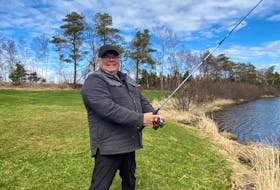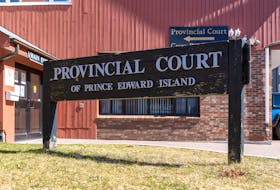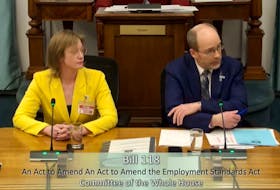Carmel MacKenzie says health care services in her rural Prince Edward Island community just aren’t what they used to be.
When her son’s croup would flare up in the middle of the night, she could call the local hospital in Souris and confer with a medical professional about whether she should bring him into the emergency room.
Things are different now.
A few weeks ago, one of MacKenzie’s family members found herself in medical distress.
“She started having this fairly violent pain in her chest,” MacKenzie said.
She called 9-1-1. It was about 11:50 p.m. Almost an hour later, at 12:40 a.m. the ambulance finally arrived.
“I was thinking, ‘Oh my god, if I had a child or someone where with an asthma attack, it would be taking maybe a year off your life by the time you’re waiting for them to get there,’” MacKenzie said.
Her family member was taken the ER in Charlottetown, almost an hour’s drive away. MacKenzie says the paramedics even asked her for directions to get back to Charlottetown.
Other area residents have similar stories of long waits for ambulances. A local grassroots advocacy group, called Islandwide Hospital Access, has been raising public concern over ambulance response times in the area.
But they’re not only upset about ambulances. They are deeply dismayed at what they believe to be a systematic erosion of rural health services and a centralization of health care to Charlottetown.
Over the last two years, the Souris hospital has been transformed into mainly a long-term care facility, with six acute care beds. The emergency room is no more. It has retained dialysis as well as lab and x-ray services. But several of these were slated to be removed from the hospital until the community protested.
“I went to public meetings only because I was interested in what they were talking about, but I was shocked that this could happen and the only way it seemed we could prevent it was to, almost, throw a tantrum,” said potato farmer Alvin Keenan.
“We’re in a terrible situation with health care.”
Committee members hope their health care concerns are considered by political parties as they develop their election platforms.
The committee that spearheaded those protests says their work is far from done. It is made up of 20 non-partisan volunteers, including doctors and other medical professionals, farmers, teachers and community advocates. They meet regularly and hold public meetings to ensure the community supports their efforts.
They have concerns about the number of family physicians in the area and what they perceive is a lack of succession planning. They question the use of a for-profit ambulance company and want be allowed to run their own service through a community-run cooperative. They are upset the province replaced the local manor with a new one but did not increase the number of beds, despite P.E.I.’s rapidly aging population.
At the heart of these and many other concerns is an overall worry for the future viability of their rural community.
“If you take this hospital and doctors out of this here community, who is going to stay here?” said committee member Fred Cheverie.
“It’s probably one of the last stalwarts we have left in Eastern Kings, is our hospital.”
Anne MacPhee, former chair of the Eastern Kings community council, says the hospital was once a big draw for new people to move to the area.
“The reduction of services is a very big part of people not coming into the area, and so now retaining what we have is more difficult,” she said.
This group, and numerous area residents who shared their thoughts with The Guardian on the streets of Souris, said they believe the erosion of local health services is killing their rural communities.
“Right now, the direction Prince Edward Island is taking is a government services centred economy in Charlottetown and there’s an unofficial policy to centralize everything in Charlottetown,” says committee spokesperson Alan MacPhee.
“If you want Prince Edward Island to survive as a vibrant province, then you have to have healthy rural communities to support the urban centre. And the cornerstone for healthy rural economies is rural health care.”
Carmel MacKenzie says health care services in her rural Prince Edward Island community just aren’t what they used to be.
When her son’s croup would flare up in the middle of the night, she could call the local hospital in Souris and confer with a medical professional about whether she should bring him into the emergency room.
Things are different now.
A few weeks ago, one of MacKenzie’s family members found herself in medical distress.
“She started having this fairly violent pain in her chest,” MacKenzie said.
She called 9-1-1. It was about 11:50 p.m. Almost an hour later, at 12:40 a.m. the ambulance finally arrived.
“I was thinking, ‘Oh my god, if I had a child or someone where with an asthma attack, it would be taking maybe a year off your life by the time you’re waiting for them to get there,’” MacKenzie said.
Her family member was taken the ER in Charlottetown, almost an hour’s drive away. MacKenzie says the paramedics even asked her for directions to get back to Charlottetown.
Other area residents have similar stories of long waits for ambulances. A local grassroots advocacy group, called Islandwide Hospital Access, has been raising public concern over ambulance response times in the area.
But they’re not only upset about ambulances. They are deeply dismayed at what they believe to be a systematic erosion of rural health services and a centralization of health care to Charlottetown.
Over the last two years, the Souris hospital has been transformed into mainly a long-term care facility, with six acute care beds. The emergency room is no more. It has retained dialysis as well as lab and x-ray services. But several of these were slated to be removed from the hospital until the community protested.
“I went to public meetings only because I was interested in what they were talking about, but I was shocked that this could happen and the only way it seemed we could prevent it was to, almost, throw a tantrum,” said potato farmer Alvin Keenan.
“We’re in a terrible situation with health care.”
Committee members hope their health care concerns are considered by political parties as they develop their election platforms.
The committee that spearheaded those protests says their work is far from done. It is made up of 20 non-partisan volunteers, including doctors and other medical professionals, farmers, teachers and community advocates. They meet regularly and hold public meetings to ensure the community supports their efforts.
They have concerns about the number of family physicians in the area and what they perceive is a lack of succession planning. They question the use of a for-profit ambulance company and want be allowed to run their own service through a community-run cooperative. They are upset the province replaced the local manor with a new one but did not increase the number of beds, despite P.E.I.’s rapidly aging population.
At the heart of these and many other concerns is an overall worry for the future viability of their rural community.
“If you take this hospital and doctors out of this here community, who is going to stay here?” said committee member Fred Cheverie.
“It’s probably one of the last stalwarts we have left in Eastern Kings, is our hospital.”
Anne MacPhee, former chair of the Eastern Kings community council, says the hospital was once a big draw for new people to move to the area.
“The reduction of services is a very big part of people not coming into the area, and so now retaining what we have is more difficult,” she said.
This group, and numerous area residents who shared their thoughts with The Guardian on the streets of Souris, said they believe the erosion of local health services is killing their rural communities.
“Right now, the direction Prince Edward Island is taking is a government services centred economy in Charlottetown and there’s an unofficial policy to centralize everything in Charlottetown,” says committee spokesperson Alan MacPhee.
“If you want Prince Edward Island to survive as a vibrant province, then you have to have healthy rural communities to support the urban centre. And the cornerstone for healthy rural economies is rural health care.”








